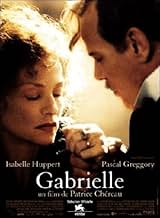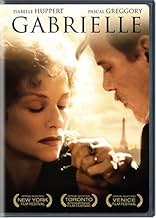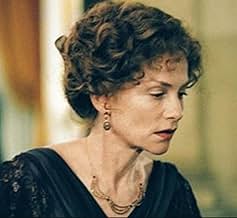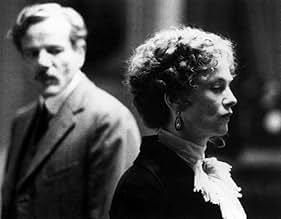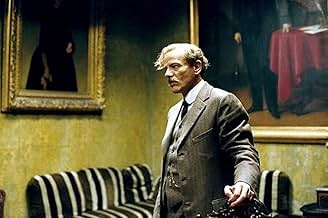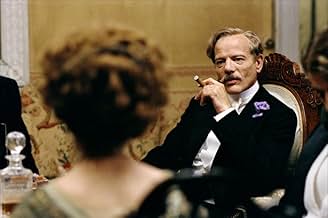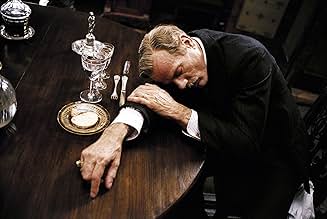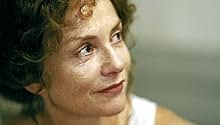Gabrielle
- 2005
- 1 h 30 min
AVALIAÇÃO DA IMDb
6,2/10
2,2 mil
SUA AVALIAÇÃO
Adicionar um enredo no seu idiomaThe marriage between Gabrielle and Jean begins to fray after the discovery of a letter that belongs to Gabrielle.The marriage between Gabrielle and Jean begins to fray after the discovery of a letter that belongs to Gabrielle.The marriage between Gabrielle and Jean begins to fray after the discovery of a letter that belongs to Gabrielle.
- Direção
- Roteiristas
- Artistas
- Prêmios
- 3 vitórias e 6 indicações no total
Florent Bigot de Nesles
- Invité
- (não creditado)
Philippe Calvario
- Guest
- (não creditado)
- Direção
- Roteiristas
- Elenco e equipe completos
- Produção, bilheteria e muito mais no IMDbPro
Avaliações em destaque
Gabrielle (2005) is a French film written and co-directed by Patrice Chéreau. It's based on a novella by Joseph Conrad.
Pascal Greggory plays Jean Hervey. He's a very wealthy businessman. He's healthy and apparently happy.
His wife, Gabrielle, is elegant and sophisticated, albeit aloof. Gabrielle is portrayed by Isabelle Huppert.
This movie sounded good on paper, but it just didn't work for me. Partly that's because Patrice Chéreau is better known as a theater director and the film looks more like a play than it looks like a movie.
Huppert is one of my favorite actors, but she's wrong for this role. We're told over and over that the couple has been married ten years, but Huppert looks closer to 50 when, in context, she should be 35 or 40. (Well, she was 52 at the time, and she has every right to look 50, but it's not appropriate for this movie.)
Finally, director Chéreau uses strange and unnecessary devices. He switches from black-and-white to sepia to color. He uses title cards like the old silent movies. The characters talk and talk, but nothing much gets said.
If a film isn't going to be enjoyable, it should teach us something. All I learned from this movie is that if you speak cruelly to your maids, they just have to bear it. Apparently, it's part of the job description to just endure.
I didn't enjoy any aspect of this film. It's hard for me to criticize an Isabel Huppert movie. I thought she could make it work. Not this time. Gabrielle has a dreadful IMDb of 6.4. I agree with my fellow raters and rated it 6.
Pascal Greggory plays Jean Hervey. He's a very wealthy businessman. He's healthy and apparently happy.
His wife, Gabrielle, is elegant and sophisticated, albeit aloof. Gabrielle is portrayed by Isabelle Huppert.
This movie sounded good on paper, but it just didn't work for me. Partly that's because Patrice Chéreau is better known as a theater director and the film looks more like a play than it looks like a movie.
Huppert is one of my favorite actors, but she's wrong for this role. We're told over and over that the couple has been married ten years, but Huppert looks closer to 50 when, in context, she should be 35 or 40. (Well, she was 52 at the time, and she has every right to look 50, but it's not appropriate for this movie.)
Finally, director Chéreau uses strange and unnecessary devices. He switches from black-and-white to sepia to color. He uses title cards like the old silent movies. The characters talk and talk, but nothing much gets said.
If a film isn't going to be enjoyable, it should teach us something. All I learned from this movie is that if you speak cruelly to your maids, they just have to bear it. Apparently, it's part of the job description to just endure.
I didn't enjoy any aspect of this film. It's hard for me to criticize an Isabel Huppert movie. I thought she could make it work. Not this time. Gabrielle has a dreadful IMDb of 6.4. I agree with my fellow raters and rated it 6.
French language period set chick flick that was so banally turgid and pretentious that I wanted to scratch thine own eyes out in those brief lucid periods I was awake. One thing I did share with what I expect the females in the audience were experiencing was the shedding of tears, the stark difference being that mine were tears of blood. If it had been a play I would have rushed out, brought a gun, then rushed back to shoot the actors on stage for in my opinion they deserve nothing but death. Put briefly, in turn of the century Paris a rather arrogant man rather abruptly finds out that his wife of 10 years desires to leave him for another man. Much talking is done. Then much more talking is done. This is followed by lengthy periods of talking. More talking. Then wrapped up with, surprisingly, talking. But it's all done in an almost monologue method , briefly interspersed with large titles on screen which I expect the makers of the movie thought to be profound yet I found completely ridiculous (the film ends with the words "AND HE NEVER RETURNED!". I thought it rude of me to puke on the floor of so gorgeous a theatre (the State in Sydney, such a beautiful and elaborate place) so I resisted with all my might). I left the cinema with a headache. Not in any way due to the complexity and depth of the story I'd just seen, but because I just wasted what I now consider to be the most valuable 90 minutes of my life ever. Even now I want to cry.
I see a great number of art-house films, so I'm not a pop culture heathen and I own many great titles in my own private DVD collection that I watch and treasure. I have nothing against glacial pacing, indeed for many wonderful films it is often delicious to slowly savour the unfolding occurrences (In My Fathers Den, Lantana, Insomnia, Mar Adentro etc) and my own favorites are indie films like Requiem For A Dream and Mysterious Skin (tho honestly a film one need watch only once due to its power and disturbing subject matter). But in this instance I would never have thought a "French language art-house drama" would be the type of film that in my opinion, gives the Adam Sandler film The Waterboy a run for it's money.
Complete dross.
I see a great number of art-house films, so I'm not a pop culture heathen and I own many great titles in my own private DVD collection that I watch and treasure. I have nothing against glacial pacing, indeed for many wonderful films it is often delicious to slowly savour the unfolding occurrences (In My Fathers Den, Lantana, Insomnia, Mar Adentro etc) and my own favorites are indie films like Requiem For A Dream and Mysterious Skin (tho honestly a film one need watch only once due to its power and disturbing subject matter). But in this instance I would never have thought a "French language art-house drama" would be the type of film that in my opinion, gives the Adam Sandler film The Waterboy a run for it's money.
Complete dross.
This up close study of a marriage in crisis is Chereau at his subtle, rich best. The infant terrible of '82 Bayreuth has matured into a maestro of cinema.
Gabrielle wants more but is unwilling to spend the effort or pay the price to get it. Her husband wants less and will settle for nothing less than less. The machinery of their marriage was running so flawlessly that it required no work by either and only modest attention. Their relations were on automatic pilot and they both seemed massively content to keep it that way. Then the machinery, briefly but ruinously, goes crazy.
Huppert and Greggory are riveting. And, not counting the credits, run time is less than 90 minutes. Good artistic judgment there by Chereau. Any longer and this film could be painful for the viewer. Jim Smith
Gabrielle wants more but is unwilling to spend the effort or pay the price to get it. Her husband wants less and will settle for nothing less than less. The machinery of their marriage was running so flawlessly that it required no work by either and only modest attention. Their relations were on automatic pilot and they both seemed massively content to keep it that way. Then the machinery, briefly but ruinously, goes crazy.
Huppert and Greggory are riveting. And, not counting the credits, run time is less than 90 minutes. Good artistic judgment there by Chereau. Any longer and this film could be painful for the viewer. Jim Smith
I saw this dark oeuvre yesterday at the Boston French Film Festival at the MFA.It was chosen to be the Opening night Film and was sold out.The director was present and spoke at length about what drew him to make the film and what was important about it- for him. I felt the film-making was fascinating. From the opening sequence, where the footage in the train station is SO realistic in its early 20th c. appearance, and throughout the film, I found the cinematography to be lush, stylized, extremely well-framed and riveting .It is a perfect voice for the story. The actors are always IN YOUR FACE and this fact, combined with an economic and well written script, heavy dark music, tremendously accurate and effective set design, and spot-on acting, made for an extremely moving and interesting exploration of the story. For me, in tone and context, it felt a bit like Henry James' Portrait of a Lady (and probably works by Ibsen and others) Isabelle Huppert and her husband are extremely wealthy, cold, unemotional,detached from themselves and others, and 'safe' in that world. Their house-where 99% of the film takes place, is a dark, heavy, classical, structured prison.(The director's background in stage directing is very evident in this film.) One little bubble bursts from that prison and then things change and the disintegration begins. It gives one a great deal to think about. My only problem with the film is the MUSIC.The music is as much an element of the film as the actors. That is not, in and of itself, a bad thing, but in the last 20 minutes of the film, it is just WAY TOO MUCH: too heavy, too loud, and too repetitive;a bit like Bruchner at his worst. But if you are able to see a DVD of this, you can turn down this overkill. If you are lucky enough to see the film live (so important for major artistic cinematography like this) you'll just have to deal with it; maybe it won't bother you so much.At any rate, the film will provide those so inclined with many things to think about and discuss. And visuals to remember. For me,I will always carry the image of Huppert, dressed in black, on that enormous settee... it's a Degas.
Based on "The Return" by Joseph Conrad, "Gabrielle" tells the story of a woman in turn-of-the-century Paris who rebels against a loveless marriage.
Jean Hervey is a successful newspaper publisher whose life is ruled far more by social obligation and ritual than by emotion or passion. He extends this philosophy to all areas of his life, even to his own wife, whom he sees less as a person with a basic human need for intimacy and passion than as an attractive ornament to be placed beside all the other artwork in his impressive collection of Greek statuary. He even proclaims rather proudly - as if it were evidence of his imperviousness to the weakness of the flesh - that, though he and his wife do share the same bedroom, they sleep in different beds. Yet, he is not above deluding himself into believing that he actually loves her, although he is the first to admit that real love requires far too much effort to really be worth his time. He takes pride in her "placid" nature, which he feels serves him well in her function as hostess for the dinner parties he throws for his friends like clockwork every Thursday night. One day, however, Jean's studiously ordered world is shattered when he finds a note from Gabrielle informing him that she has run off with another man. A few moments later, though, Gabrielle mysteriously returns home, having been unable to make that final break for reasons not entirely fathomable either to herself or to us. The remainder of the film is spent examining the couple's efforts to cope with the situation.
This theme - of an aristocratic, free-spirited woman trapped in a figurative gilded cage by either the man in her life or society as a whole - was not exactly a novel one even at the time the story was written, but what separates "Gabrielle" from similar works is its unique concentration on the man instead of the woman, on HIS repression and inadequacies rather than hers. This leads to a conclusion rich in irony as Jean, the passionless purveyor of propriety, becomes ever more eaten up by his own jealousies and obsessions. Jean reveals much of what he's thinking through voice-over narration, as Gabrielle serves as a catalyst for his own emotional revolution.
If "Gabrielle" reminds us of anything, it is of a film by Ingmar Bergman, one in which the characters talk out the minutiae of their relationships and their innermost feelings and thoughts at almost agonizing length - tedious to some in the audience, perhaps, but fascinating to others. Patrice Chereau and Anne-Louise Trividic's literate screenplay plumbs the depths of the two souls involved, while Chereau's direction keeps things moving by employing a camera that sweeps with almost reckless abandon through the dusky rooms and crowded salons where the action takes place.
Isabelle Huppert and Pascal Greggory are perfectly cast foils as the husband and wife for whom "love" is no longer a viable option. Each of the actors seethes with an intensity that reveals the passions that have long lain dormant under the couple's placid exteriors.
Although Gabrielle may be the first of the two to throw off the cloak of respectability and go for what really matters, it is Jean's intense struggle with his own inner demons that commands most of our attention. For despite the title being "Gabrielle," the film turns out to be much more Jean's story in the end than hers.
Jean Hervey is a successful newspaper publisher whose life is ruled far more by social obligation and ritual than by emotion or passion. He extends this philosophy to all areas of his life, even to his own wife, whom he sees less as a person with a basic human need for intimacy and passion than as an attractive ornament to be placed beside all the other artwork in his impressive collection of Greek statuary. He even proclaims rather proudly - as if it were evidence of his imperviousness to the weakness of the flesh - that, though he and his wife do share the same bedroom, they sleep in different beds. Yet, he is not above deluding himself into believing that he actually loves her, although he is the first to admit that real love requires far too much effort to really be worth his time. He takes pride in her "placid" nature, which he feels serves him well in her function as hostess for the dinner parties he throws for his friends like clockwork every Thursday night. One day, however, Jean's studiously ordered world is shattered when he finds a note from Gabrielle informing him that she has run off with another man. A few moments later, though, Gabrielle mysteriously returns home, having been unable to make that final break for reasons not entirely fathomable either to herself or to us. The remainder of the film is spent examining the couple's efforts to cope with the situation.
This theme - of an aristocratic, free-spirited woman trapped in a figurative gilded cage by either the man in her life or society as a whole - was not exactly a novel one even at the time the story was written, but what separates "Gabrielle" from similar works is its unique concentration on the man instead of the woman, on HIS repression and inadequacies rather than hers. This leads to a conclusion rich in irony as Jean, the passionless purveyor of propriety, becomes ever more eaten up by his own jealousies and obsessions. Jean reveals much of what he's thinking through voice-over narration, as Gabrielle serves as a catalyst for his own emotional revolution.
If "Gabrielle" reminds us of anything, it is of a film by Ingmar Bergman, one in which the characters talk out the minutiae of their relationships and their innermost feelings and thoughts at almost agonizing length - tedious to some in the audience, perhaps, but fascinating to others. Patrice Chereau and Anne-Louise Trividic's literate screenplay plumbs the depths of the two souls involved, while Chereau's direction keeps things moving by employing a camera that sweeps with almost reckless abandon through the dusky rooms and crowded salons where the action takes place.
Isabelle Huppert and Pascal Greggory are perfectly cast foils as the husband and wife for whom "love" is no longer a viable option. Each of the actors seethes with an intensity that reveals the passions that have long lain dormant under the couple's placid exteriors.
Although Gabrielle may be the first of the two to throw off the cloak of respectability and go for what really matters, it is Jean's intense struggle with his own inner demons that commands most of our attention. For despite the title being "Gabrielle," the film turns out to be much more Jean's story in the end than hers.
Você sabia?
- ConexõesReferenced in Lei & Ordem: Crimes Premeditados: Blind Spot (2006)
Principais escolhas
Faça login para avaliar e ver a lista de recomendações personalizadas
- How long is Gabrielle?Fornecido pela Alexa
Detalhes
Bilheteria
- Faturamento bruto nos EUA e Canadá
- US$ 332.829
- Fim de semana de estreia nos EUA e Canadá
- US$ 30.676
- 16 de jul. de 2006
- Faturamento bruto mundial
- US$ 2.775.311
- Tempo de duração
- 1 h 30 min(90 min)
- Cor
- Mixagem de som
- Proporção
- 2.35 : 1
Contribua para esta página
Sugerir uma alteração ou adicionar conteúdo ausente

